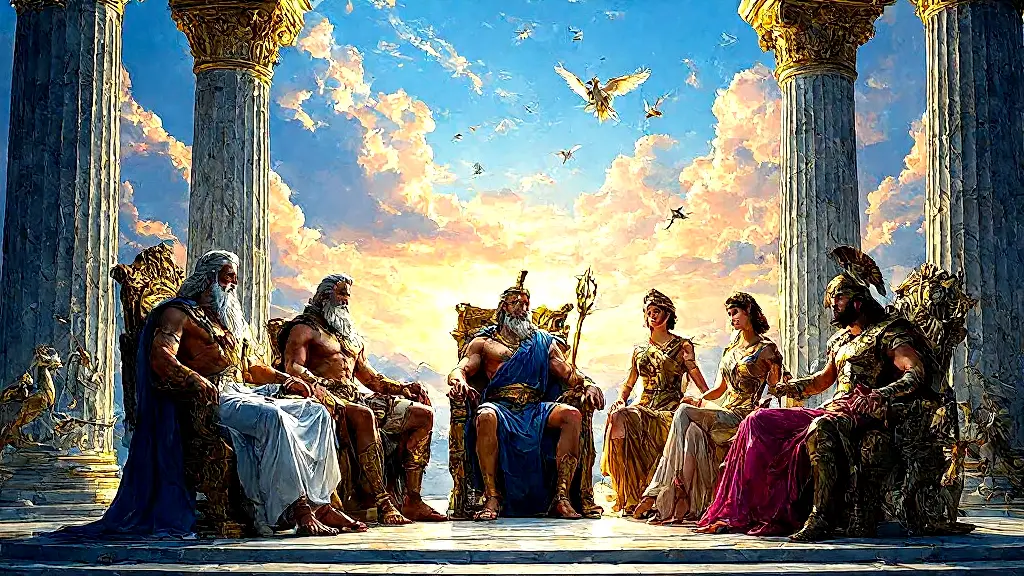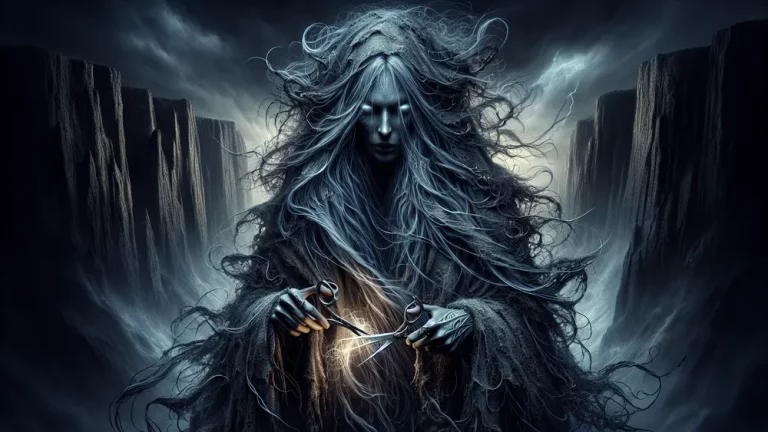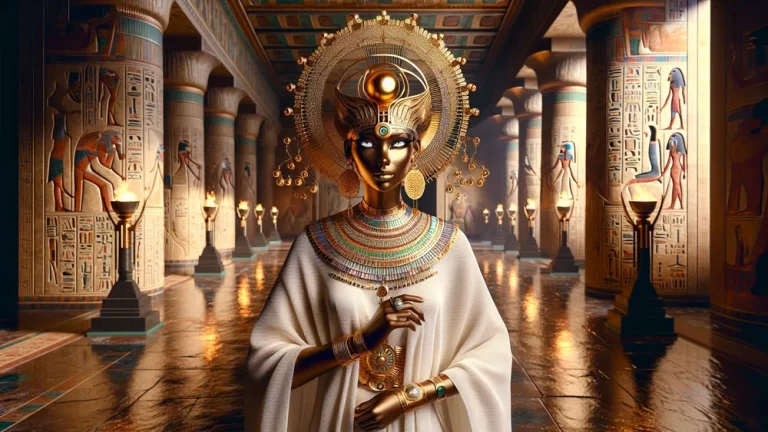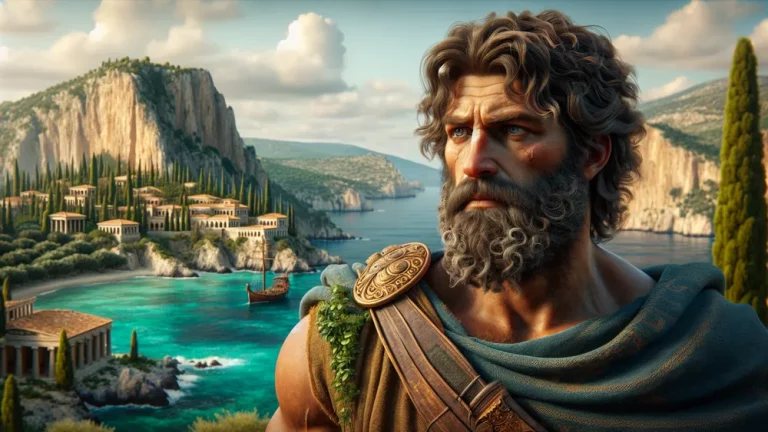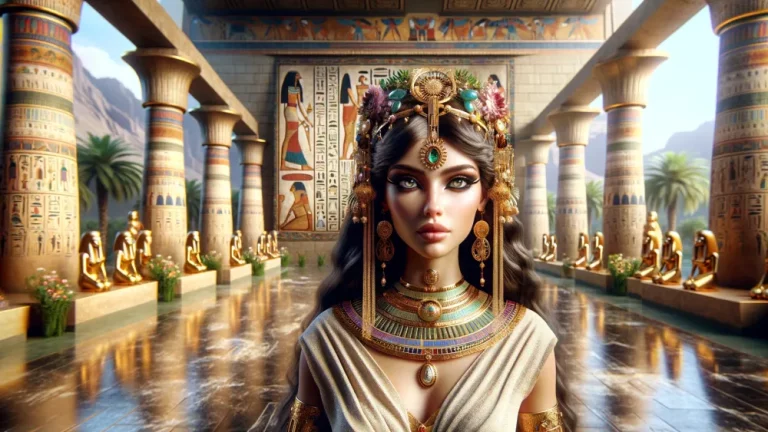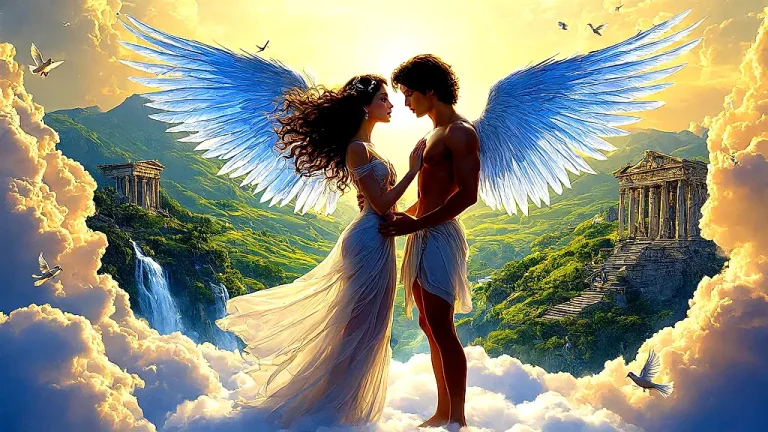The Council Of 9 In Greek Mythology: Gods And Their Roles
You’ve probably heard about the “Council of 9” in Greek myths. Here’s the truth: no such ruling group ever existed. The real authority belonged to the Twelve Olympians, the gods who ruled the universe from Mount Olympus. They overthrew the Titans and took control. Groups of nine, like the Muses or the underworld judges, did appear in stories.
Key Points:
- The Twelve Olympians, not a Council of 9, were the main gods ruling from Mount Olympus after beating the Titans.
- Nine Muses, daughters of Zeus, inspired arts like poetry and music but had no real power over the world.
- Other groups of nine, like underworld judges or Oceanids, had special jobs but didn’t rule like the Olympians.
- People mix up the number nine because the Muses were famous, and other cultures, like Egypt, had nine-god groups.
- The Olympians split control after the Titanomachy war—Zeus got the sky, Poseidon the sea, and Hades the underworld.
- Gods in the Iliad argued and picked sides in the Trojan War, with Zeus often making the final call.
- Plato’s myth of Er tells of nine judges in the afterlife deciding souls’ fates, not gods, but dead heroes.
But they never held actual power. The Olympians were the main leaders, while others had smaller roles. This blog explains why the Olympians dominated, why the number nine appears in myths, and clears up common misunderstandings. All of this comes from ancient sources like Hesiod’s Theogony and Homer’s Iliad.
Council Of 9 In Greek Mythology: Overview and Key Facts
| Concept | Factual Overview | Why the Confusion Exists? | Source References |
|---|---|---|---|
| “Council of 9” Myth | Ancient Greek texts never mention a ruling council of nine gods. The real rulers were the Twelve Olympians, who won power after defeating the Titans in a great war. | People sometimes mistake the Muses (a group of nine) for a ruling council. | Hesiod’s Theogony, Homer’s Iliad |
| The Muses | Nine daughters of Zeus and Mnemosyne, each linked to a different art (like Calliope for epic poetry). They encouraged creativity but had no political power. | Because they were famous, people wrongly thought they had authority. | Hesiod’s Theogony |
| Underworld Judges | In Plato’s Republic, nine mortal heroes (including Achilles) judged souls after death – not gods, and not Olympians. | Later authors mixed up underworld stories with divine leadership. | Plato’s Republic |
| Oceanids | Some records list nine of Oceanus‘ 3,000 daughters (such as Styx), but they were nymphs, not leaders. | Their symbolic roles (like Styx’s oath-binding) made people think they had power. | Hesiod’s Theogony |
| Egyptian Ennead | The Heliopolitan Ennead (nine Egyptian gods) ruled in Egyptian myth – which might have influenced Greek stories. | Cultural exchanges led to similar numbers in myths. | Pyramid Texts |
Divine Councils in Other Mythologies
Greek myths focus mainly on the Olympians, but other ancient cultures had their own divine councils too. Each one developed unique ranks and stories about how their gods shared power.
The Twelve Olympians: Greece’s Real Ruling Council
Now that we’ve cleared up that myth about a “Council of 9,” let’s examine the actual rulers – the Twelve Olympians. This powerful group took control after defeating the Titans in the great war known as the Titanomachy.
How the Olympian Council Began
The Olympian Council began with the Titanomachy, a ten-year war that changed the world order. Zeus and his siblings defeated their father Cronus and the Titans to take power. Hesiod’s Theogony describes how this council formed through several important events:
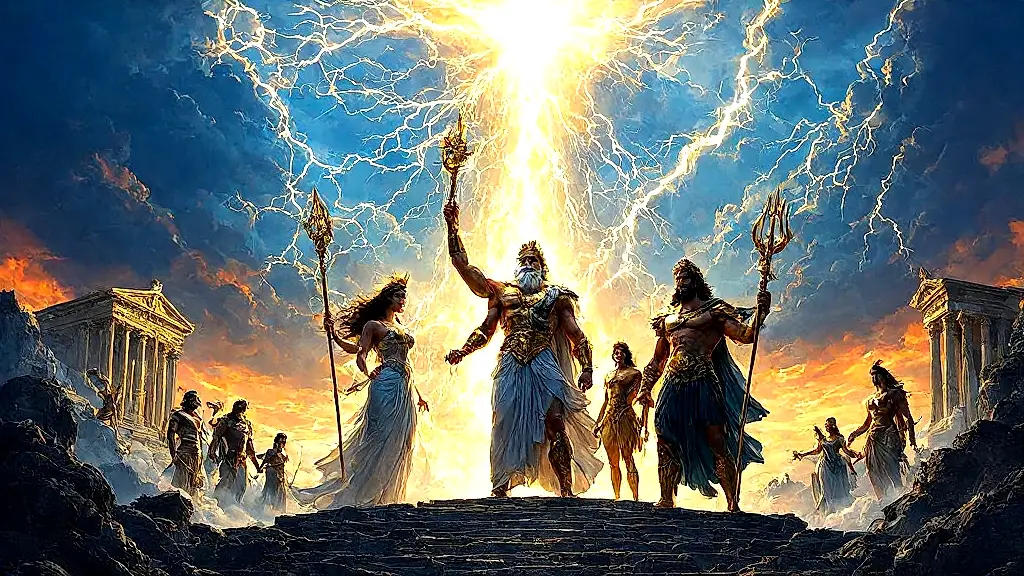
- The Titanomachy: Zeus rescued his swallowed siblings (including Poseidon and Hades) and led them against Cronus’ rule
- Division of Powers: After winning, the three brothers divided control – Zeus took the sky, Poseidon the sea, and Hades the underworld
- Council Formation: Gods who fought against the Titans became Olympians, though ancient texts sometimes disagree about who was included
- Olympian Requirements: To join, deities needed important responsibilities and direct roles in keeping the world running
Some accounts leave Hades out of the twelve because he ruled the underworld, while others count him among them. The exact members changed over time as different regions honored different gods, with Dionysus sometimes taking Hestia’s place in later traditions.
Zeus and his brothers beat their father Cronus in a big war, then split power over the sky, sea, and underworld while other gods who helped joined their ruling group.
The Olympian Gods and Their Powers
The Twelve Olympians each controlled specific areas of the ancient Greek world. While Zeus ruled as king, the other gods had complete control over their domains, from Poseidon’s seas to Athena‘s warfare. Greeks believed these deities directly affected people’s lives, whether through Demeter‘s crops or Apollo‘s prophecies.
| Deity | Domain | Symbol | Notable Power |
|---|---|---|---|
| Zeus | Sky, Thunder, Kingship | Lightning bolt | Weather control, divine justice |
| Hera | Marriage, Women | Peacock, Pomegranate | Bless/curse marriages |
| Poseidon | Seas, Earthquakes | Trident | Create storms, shake land |
| Demeter | Agriculture, Harvest | Wheat sheaf | Control crop growth |
| Athena | Wisdom, Strategic War | Owl, Aegis | Grant tactical advantage |
| Apollo | Sun, Music, Prophecy | Lyre, Laurel | Healing, oracular visions |
| Artemis | Moon, Hunting | Bow, Deer | Protect women in childbirth |
| Ares | Violent War | Spear, Vulture | Inspire battlefield frenzy |
| Aphrodite | Love, Beauty | Dove, Myrtle | Manipulate desire |
| Hephaestus | Fire, Craftsmanship | Hammer, Anvil | Create indestructible items |
| Hermes | Travel, Commerce | Caduceus, Winged sandals | Instant travel between worlds |
| Dionysus | Wine, Ecstasy | Thyrsus, Grapevine | Induce madness or inspiration |
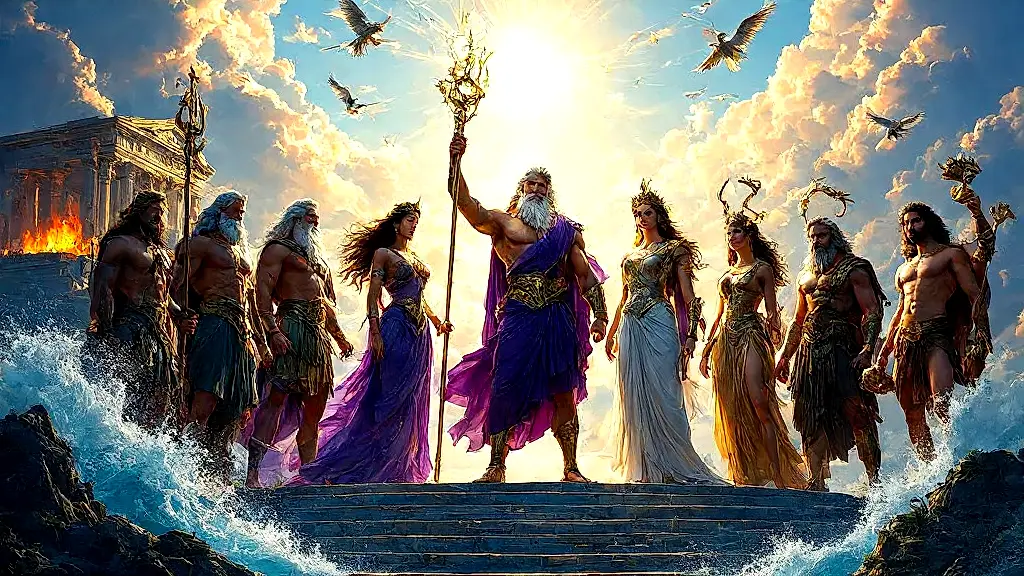
Note: Some versions substitute Hestia (hearth) for Dionysus, which shows regional differences in worship. Ancient texts reveal that gods sometimes used powers outside their main areas, like Athena affecting storms despite Zeus controlling the sky. This demonstrates how Greeks saw their gods as complex figures rather than simple representations of single concepts.
How the Gods Met on Mount Olympus
The Olympians gathered on Mount Olympus, in halls with golden floors. Zeus sat on a tall marble throne at the center, with Hera to his right and Poseidon to his left. Meanwhile, messenger gods like Iris traveled quickly to call others to meetings. They ate ambrosia, their food, and drank nectar, their wine, while discussing important matters.
According to protocol, they needed Zeus’s permission to speak, but heated arguments often broke out. This happened especially when gods supported different human sides in wars. Some stories describe these meetings happening in a great hall with furniture made by Hephaestus. Others suggest the gods met outdoors on clouds, where they could watch events on earth below.
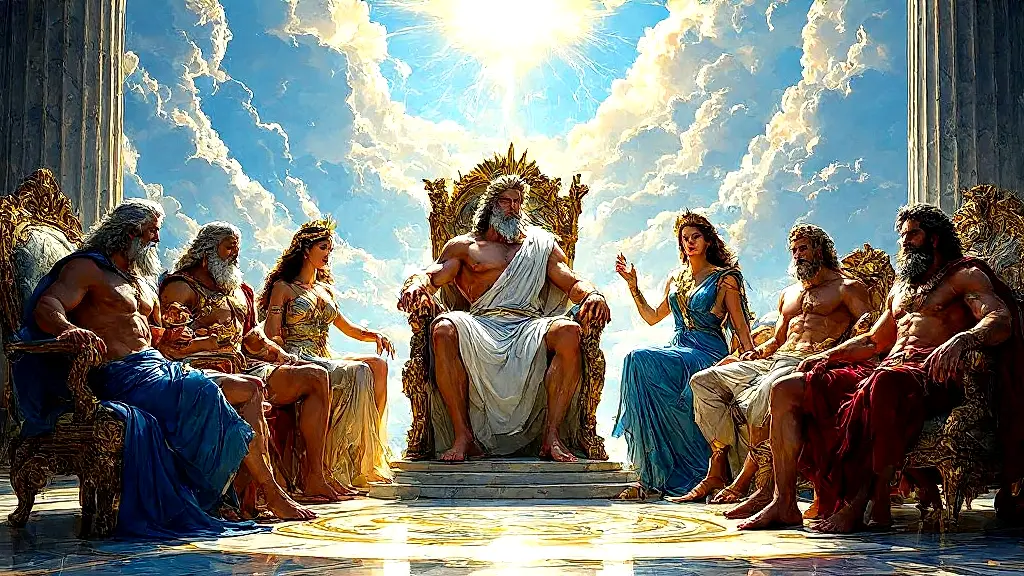
The Mystery of the Number Nine in Greek Myths
While twelve defined the Olympian council, the number nine was also important in Greek mythology’s most influential groups.
The Muses: Zeus and Mnemosyne’s Nine Daughters
Zeus and Mnemosyne (Memory) had nine daughters after spending nine nights together. These became the Muses, who inspired everything from poetry to astronomy. Ancient Greeks would call on them at the start of any creative work because they thought the Muses could provide inspiration. Their home on Mount Helicon was an important place for artists and writers.
Here are all nine Muses and what they represented:
- Calliope: Epic poetry (writing tablet and stylus)
- Clio: History (scrolls and books)
- Euterpe: Lyric poetry (aulos/flute)
- Thalia: Comedy (comic mask and ivy wreath)
- Melpomene: Tragedy (tragic mask and sword)
- Terpsichore: Dance (lyre and plectrum)
- Erato: Love poetry (cithara/lyre)
- Polyhymnia: Sacred hymns (veiled and pensive)
- Urania: Astronomy (globe and compass)
Early sources sometimes show variations – some traditions only had three Muses before the nine became standard. Unlike the Olympians who ruled over nature and human affairs, the Muses focused only on arts and knowledge. Their name means “reminders”, connecting to their mother Mnemosyne, showing how Greeks saw creativity as a form of divine memory.
Other Important Groups of Nine
Besides the Muses, Greek mythology had other key groups with nine members, each responsible for different areas. The Oceanids were nine important water nymphs among three thousand daughters of Oceanus, who represented different waters. Hesiod names some like Peitho, Admete, and Ianthe, though lists vary. Another group was the nine underworld judges from Plato’s Republic.
These included famous heroes like Minos, Rhadamanthys, and Aeacus, plus six others who were selected for being wise. They decided where souls would go after death. There were also ninefold versions of important gods in some areas. For example, Spartans worshipped Artemis in nine forms (Pausanias 3.16.9).
These groups often changed depending on location and time, showing how the number nine was important in rituals beyond just the Muses.
Why People Mix Up Nine
People often confuse numbers in mythology. Many think Greek gods had a “Council of Nine” instead of twelve Olympians. This happens because the Muses were so well-known that people think nine was more important for ruling gods. Ancient writers also sometimes used numbers symbolically rather than exactly. Here are the main reasons for the confusion:
- Cultural prominence of the Muses: As the most famous nine-member group, they were more well-known than the Olympians’ government
- Egyptian influence: The Heliopolitan Ennead (nine Egyptian gods) might have affected Greek ideas through cultural exchange
- Numerical symbolism: Ancient cultures gave important meanings to numbers like three, seven, and nine
- Translation issues: Some ancient texts mention “groups of gods” without saying how many
This confusion shows how oral traditions and cultural exchanges changed mythological details over time. Just like people today might confuse similar sports teams, ancient people could mix up numbers of divine groups, especially when they worked with sacred numbers that had special meanings beyond actual counts.
People mix up the number of Greek gods because the famous nine Muses were better known than the twelve Olympians, and ancient cultures often used numbers symbolically rather than literally.
Famous Stories About the Gods’ Meetings
The Olympians’ council did more than just meet – their gatherings became important myths. These stories affected Greek beliefs about how the world worked.
The Titanomachy: Gods vs. Titans
The Titanomachy was a ten-year war that changed Greek mythology’s power structure. According to Hesiod’s Theogony, it began when Zeus freed his siblings from their father Cronus, then led them against the Titans. This was part of a pattern where each generation of gods overthrew the previous one. During the war, the Cyclopes made powerful weapons: lightning bolts for Zeus, a trident for Poseidon, and an invisibility helmet for Hades.
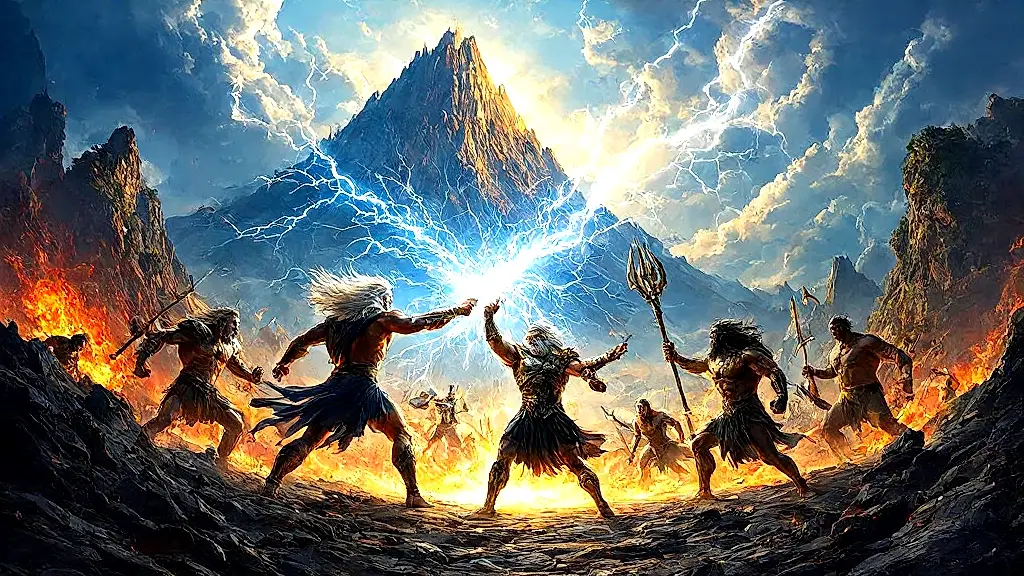
Major battles happened in Thessaly, with the Titans based at Mount Othrys and the Olympians at Mount Olympus. Ancient texts describe massive earthquakes as gods fought, with some like Aegaeon throwing entire islands. Later, Ovid wrote about the Titans being imprisoned in Tartarus, the deepest part of the underworld. Some Titans, including Prometheus and Themis, actually helped the Olympians. After winning, the Olympians divided control of the world.
Zeus ruled the sky, Poseidon the seas, and Hades the underworld. This established the Olympian council led by Zeus, though some stories say his power was sometimes challenged. Archaeologists have found 6th-century BCE vases that show the war, proving how important this myth was. It explained both who ruled the Greek gods and how they came to power.
The Gods’ Debates in the Iliad
The gods in the Iliad argued frequently and sometimes took direct action in the Trojan War. Homer shows Olympus deeply involved in human conflicts, with gods choosing sides based on personal connections. Aphrodite helped Paris, while Athena and Hera supported the Greeks because Paris had offended them. Their meetings led by Zeus weren’t just for show – they decided when gods could help, with Zeus sometimes stopping conflicts between them.
The gods formed clear groups like the human armies. Apollo and Ares joined Aphrodite to help Troy, even though Ares was originally Greek. Meanwhile, Poseidon allied with Hera and Athena for Greece. These debates revealed the gods’ limits – even Zeus couldn’t ignore the Moirai (Fates), though he famously weighed the destinies of Achilles and Hector on golden scales.
This situation showed how gods’ pride and revenge affected human battles. Several important debates changed the war. In Book 4, Zeus unwillingly let Hera make the Trojans break a treaty. Book 8 shows Zeus banning godly help, though Athena and Hera later found ways around his order. The biggest fight happened in Book 20, when Zeus allowed temporary theomachy – gods fighting each other directly, with Poseidon facing Apollo and Athena battling Ares.
These weren’t just exciting scenes; they showed Greek beliefs about how gods and humans influenced events together.
The Judgment of Paris
The Trojan War began when Eris, the goddess of discord, wasn’t invited to Peleus and Thetis‘ wedding. She threw a golden apple marked “to the fairest” among the guests, starting a contest that changed history. Paris, a Trojan prince raised as a shepherd, had to choose between three goddesses: Hera offered power, Athena promised victory in war, and Aphrodite guaranteed the most beautiful woman.
This was a difficult choice that would anger two powerful Olympians no matter what he decided. Ancient texts say each goddess used different arguments. Hera stressed her royal position, Athena showed her battle skills, and Aphrodite let her robes slip while mentioning Helen of Sparta’s great beauty. Paris chose Aphrodite, a scene often shown on vases where he holds his shepherd’s staff.
His decision broke sacred xenia rules when he later took Helen from her Greek husband Menelaus. The Cypria epic says Zeus planned this contest to reduce human numbers, showing how gods used mortals for their purposes. The effects lasted for years. Hera and Athena helped the Greeks in the Trojan War to get revenge, while Aphrodite protected Paris during battles.
Some stories add details – Hermes didn’t want to guide the goddesses at first, and Paris tried to refuse judging. What started as a contest between goddesses became the clearest example of how a mortal’s choice could start a war, with Paris’ decision leading to Troy’s ten-year siege.
The Underworld’s Nine Judges
The Olympians ruled over living people. In the underworld, nine mortal heroes who became judges decided what happened to souls after death. Plato described this group in his writings.
Plato’s Myth of Er
Plato describes an afterlife system in Republic Book 10. The story follows Er, a warrior from Pamphylia who saw the underworld after nearly dying. Unlike Homer’s dark version of Hades, Plato’s afterlife has nine divine judges who decide souls’ fates. Three were famous – Minos, Rhadamanthys, and Aeacus – while six others remained unnamed. These judges examine each life carefully. Good souls go upward to rewards, while bad ones face punishments underground.
After judgment, souls choose their next lives from available options. Some famous figures, like Odysseus, picked simple lives, while others foolishly chose power without understanding the consequences. Plato includes the Spindle of Necessity, which shows the planets’ movements through eight circles. This combines mythology with early astronomy. The story isn’t just a myth – it’s Plato’s way to argue about moral responsibility and justice after death.
His version offered a new perspective that differed from traditional Greek beliefs.
Plato’s afterlife story tells how souls get judged and pick their next lives, mixing mythology with ideas about justice and choices.
FAQs
1. Was there a literal Council of 9 in Greek mythology?
A literal “Council of 9” did not exist in Greek mythology, as the Twelve Olympians were the primary ruling gods, while the number nine referenced groups like the Muses.
2. Who were the Twelve Olympians?
The Twelve Olympians were the principal gods of Greek mythology, ruling from Mount Olympus.
3. What distinguished the Muses from Olympians?
What distinguished the Muses from Olympians was their role as divine inspirers of the arts, while the Olympians held dominion over cosmic forces like war, the sea, and the heavens.
4. Did gods vote in councils like humans?
While gods did debate in councils, voting like humans was rare, with Zeus often making the final decision.

